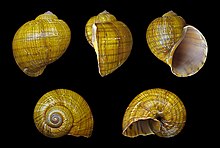Pomacea canaliculata
| Pomacea canaliculata | |
|---|---|
 |
|
| Five views of a shell of Pomacea canaliculata, Shell diameter 8 cm | |
| Scientific classification | |
| Kingdom: | Animalia |
| Phylum: | Mollusca |
| Class: | Gastropoda |
| (unranked): |
clade Caenogastropoda informal group Architaenioglossa |
| Superfamily: | Ampullarioidea |
| Family: | Ampullariidae |
| Genus: | Pomacea |
| Subgenus: | Pomacea |
| Species: |
Pomacea canaliculata (Lamarck, 1819) |
informal group Architaenioglossa
Pomacea canaliculata, common name the channeled applesnail, is a species of large freshwater snail with gills and an operculum, an aquatic gastropod mollusk in the family Ampullariidae, the apple snails. South American in origin, this species is considered to be in the top 100 of the "World's Worst Invasive Alien Species".
The shells of these applesnails are globular in shape. Normal coloration typically includes bands of brown, black, and yellowish-tan; color patterns are extremely variable. Albino and gold color variations exist.
The size of the shell is up to 150 mm in length.
The native distribution of P. canaliculata is basically tropical and subtropical, including Argentina, Bolivia, Paraguay, Uruguay, and Brazil. The southernmost record for the species is Paso de las Piedras reservoir, south of the Buenos Aires province, Argentina.
This species also occurs in the United States, where the initial introductions were probably from aquarium release, aka "aquarium dumping". The non-indigenous distribution includes: Lake Wawasee in Kosciusko County, Indiana;Langan Park and Three Mile Creek in Mobile, Alabama; a pond bordering the Mobile-Tensaw River Delta in Baldwin County, Alabama; Little Wekiva River, Orlando, Florida; a lake near Jacksonville, Florida;Miramar Reservoir in San Diego County, California; and a pond near Yuma, Arizona. Established populations exist in California and Hawaii.
...
Wikipedia

